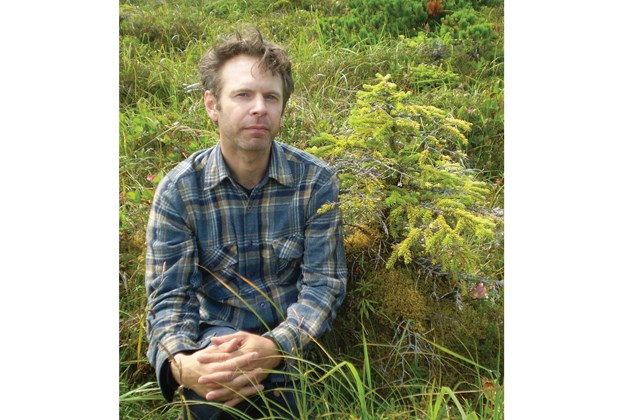- Derrick Stacey Denholm, author of Ground-Truthing: Reimagining the Indigenous Rainforests of B.C.'s North Coast, will present a talk and slideshow Sunday, April 12 at 1:30 p.m. at North Vancouver's Lynn Canyon Ecology Centre. Free.
In his new book, Derrick Stacey Denholm issues a call for readers to keep the northwestern rainforests of B.C. at top of mind.
The author of Ground-Truthing: Reimagining the Indigenous Rainforests of B.C.'s North Coast, is an award-winning visual artist, writer and musician. He has also spent 25 years as a forestry field worker, planting trees, marking cutblock boundaries and timber-cruising.
His book, recently published by Caitlin Press, is intended to guide readers through the host of social, ecological and economic issues dominating the region.
Denholm plans to offer insight into his unique perspective and speak about why B.C.'s North Coast matters to us all, Sunday, April 12 at an event at the Lynn Canyon Ecology Centre at 1:30 p.m. He plans to offer an in-depth background of the historic and current issues important to the north, as well as discuss why the integrity of the indigenous rainforest is important to the long-term health of the region.
The 46-year-old, who is currently based in Prince George, wrote Ground-Truthing partly while living in Vancouver while he was studying at the University of British Columbia, and mostly in Prince Rupert. Born in East Vancouver, he has lived the majority of his life in the wild and remote north of the province.
The North Shore News recently caught up with Denholm to find out more.
North Shore News: What did you hope to accomplish in writing this book?
Denholm: It started out as a simple and personal love letter to the rainforests of the North Coast, but turned into a fairly intense analysis of colonial history and the treatment of First Nations peoples, which I felt a responsibility to engage, in order to at least attempt to better educate the general public, who are growing more sympathetic to First Nations concerns, but still don't have much of a clear picture of the facts, especially up here in the remote, wild north.
North Shore News: What did you find out that surprised you in the course of your research?
Denholm: That despite living and working in the forests up here for over 20 years, I knew next to nothing about the complex inter-relationship of the forests with its indigenous peoples, and that I knew next to nothing of any value about indigenous peoples themselves. There was a great deal of unlearning a lifetime of Canadian myths along with the learning of true facts about the region and its history.
North Shore News: You're coming from a unique background of a forestry worker, writer, artist and musician. How does that impact your perspective?
Denholm: While most people in the north work their local jobs in order to raise a family, I live and work here in order to write books and hopefully raise awareness. People come from the south or back East to write about the region, whether they be academics or other artists, but I've been walking in the forest and thinking about what I see here and in the small villages from Smithers to Old Masset for 25 years.
I am imbedded in and indebted to this place and I know the nuances of the place intimately. I went through the paradoxes of cabin fever, isolation and despair as well as the close sense of hinterland community that is deeper than any family ties.
As an artist, with no kids to worry about and no burden of debt and all the other norms of conformity that goes along with Canadian responsibilities in small northern villages, I have both the freedom and the responsibility to speak up. And I do.
North Shore News: What can community members do across the province to protect the northwestern rainforests of B.C.?
Denholm: The biggest problem I see is that the majority of the wealth of the north is and has always been extracted and removed by businesses and corporations located in the south, mostly in the Fraser Valley and Metro Vancouver, and more and more from oil and gas interests located in Alberta.
So much focus is rightly being placed upon Enbridge's Northern Gateway Pipeline, which merits it, but for the last seven or eight years the plight of the rainforests themselves have been fairly forgotten about. As with ecological problems everywhere, people need to be very self-critical of their consumption patterns.
As for protecting the north, I don't advise people burn fossil fuels to come for a visit unless they are doing some kind of responsible work.
Keep pressuring the government about your concerns about the LNG development, potential fracking, mines proposed for the Sacred Headwaters, the Northern Gateway Pipeline, and remember that the Great Bear Rainforest Initiative of 2009 still allows for logging within over 60 per cent of the area covered by the agreement.
Put the pressure on from your home, using your keyboard, and vote ethically when the time comes.
North Shore News: Who do you suggest reads this book?
Denholm: Anyone who cares about the future of not only their own home but the world in general, as the things happening in the north are happening in developing countries all over the world.
During his stint in the Lower Mainland, Denholm will also present talks and slideshows at Vancouver's Banyen Books & Sound, April 15 at 6:30 p.m., and The Paper Hound April 16, at 6:30 p.m.



